CW: In this episode we do mention some specific weights and sizes. If numbers are triggering to you, you might want to skip this episode.
Virginia
You're listening to Burnt Toast! This is the podcast about diet culture, fatphobia, parenting and health. I'm Virginia Sole-Smith. I also write the Burnt Toast newsletter.
Corinne
And I'm Corinne Fay. I work on Burnt Toast and run @SellTradePlus, an Instagram account where you can buy and sell plus sized clothing.
Virginia
So you are all very lucky because you are getting two Corinne episodes this month. We had our regular March mailbag episode, and I asked her to join me for today's community episode. Thank you, Corinne!

Corinne
Thanks for having me. The theme of today's episode is, “How do we feel about the word fat?”
Virginia
This is something we've been talking about because, as we're going to get into, there's stuff in the—well I was going to say news, but it doesn't exactly make the news.
Corinne
It’s news for us.
Virginia
It’s news for us. It's not on the evening news. But there's a lot of stuff happening in fat activism circles right now, which got us thinking about this question again. Because it's an evergreen question, right? We've covered it on the newsletter before: Who gets to call themselves fat? What if you just don't want to use the word fat? What if you just don’t want to be fat? And it feels like time to get into these questions again.
So, Corinne, tell us your story. When did you start using the word fat? And specifically, when did you reclaim the word fat for yourself?
Corinne
I have this core memory of reading a teen magazine with one of my friends in middle school. The magazine said something about, like, plus size models or something. And I remember just being like, “But what is plus size?” Like, I don't know what that means and I know that I’m on the edge. And I just remember my friend being like, “Oh my God, Corinne, you are not plus size.”
Virginia
Oh and she thought that was very reassuring.
Corinne
Yeah, and I think also was genuinely like “you're not.” I was probably like a size 12 and plus size models are smaller than that.
Virginia
Yeah in modeling land, as we learned from the midsize queens, thats on the large size for many plus size models.
Corinne
Yeah, I had a huge ribcage.
The other childhood memory I have of fatness is I remember coming across the book Fat! So?
Virginia
Oh, by Marilyn Wann, right?
Corinne
Yeah, in the public library. Like, I stumbled across it.
Virginia
Oh, what a great find for a kid!
Corinne
I know. I would love to know what librarian put it on a display shelf.
Virginia
Bless her or him or them.
Corinne
I found it and I remember being like, I really want to read this. I'm so interested, and also I don't want anyone to see me reading this and think that I'm fat. It felt very not allowed.
Virginia
Were you fat at that point?
Corinne
I mean, I think it was probably around the same age, like I was probably like a size 12 or 14, but also like 12 years old, you know?
Virginia
So in that gray space where holding a book with the word fat on the cover, you would feel like you were announcing it. Like coming out.
Corinne
Yes, and suddenly people would notice that I was fat as if they hadn't been noticing the whole time. I think there is something about when you do sort of decide that you're going to embrace that word, you do have to admit that you are fat and people know you're fat. Like, there's this way in which if you don't talk about it, then no one notices.
Virginia
If you're not talking about it, even if they're noticing, maybe most people who are kind to you and in your life will not talk about it.
Corinne
And then I think around 2016, I really had a mind change around it. Honestly, I think it was really influenced by Shrill by Lindy West and also that This American Life episode. I think that was the first time that I was really seeing some of my experiences reflected back to me in media. And then I was fully just like, I'm fat.
Virginia
That's so powerful. Shrill was so powerful for so many people. The book and the show. That totally makes sense.
Corinne
What about you?
Virginia
I don't have one moment like that, like finding Marilyn Wann or finding Lindy. And I think part of it is because my fatness came on quite gradually, if that makes sense. Like I was a thin kid, I had thin privilege. I got fatter my freshman year of college, but still wore straight sizes. Then did a lot of dieting and stuff in my 20s to stay in straight sizes. So my 30s were about giving up dieting and settling into my adult body, which has always intended itself to be a small fat body. So it was the process of stopping fighting that.
But I think I struggled to claim it a little bit. Finding “small fat” was really helpful for me, because I didn't want to be claiming fat and implying that my experience was that of people who deal with more oppression than I do.
The other piece of it that was more conscious was, that I really wanted to reclaim the word in our house around our kids. And by reclaim, I mean just claim it for them because they didn't have a negative association, you know? I wanted to give them a baseline of fat as a positive word. That helped me really lean into it.
Particularly, I would say in the last five years or so, it's been really cool to see my kids use it in a very offhand whatever kind of way. That is also why I put it in the book title.
And so, every interview I'm doing for the book now, I feel somewhat surprised, but also not, that one of the questions is always, “tell us, why do you use the word fat?”
Corinne
Interesting.
Virginia
Particularly by straight size folks, I'm being asked it a lot. Like, “why do you say the word fat?” And, “do I have to say fat?” And, “can I say fat?” And, “what's the power of teaching kids to say fat?” It makes me realize how many people still are, like, nowhere with that reclaiming concept.
Corinne
Just in getting ready for this, I googled Fat! So? and was looking at some excerpts online and I was really struck by how relevant it seems. It seems like the same stuff we're talking about now in a lot of ways. And it came out in 1998.
Virginia
Oh, God. Thank you, Marilyn Wann. I don't think I realized it was quite that old. I thought it was like 2010s or something.
Corinne
Yeah, I was really surprised.
Virginia
It must be very irritating to be in that first or second wave of fat activists who put all that work out and then there is all of us being like, “we've newly acquired this language,” and they're like, “yeah, it’s been there. Thanks. Thanks for that.” Yeah, we see the labor for sure.
Corinne
Well, on that note, we're gonna hear from a Burnt Toast community member named Valerie, just about the power of reclaiming that word.
I am what's considered super fat, which is the terminology we use at the nolose fat liberation queer conference, where I really learned most of what I know about fat liberation. Even if someone can only see my face over Zoom, it's very clear that I am fat. And I have been fat since I was nine years old. I was very severely bullied in late elementary, middle, and high school for my weight. And though my parents never put me on a diet or made me feel bad directly about my body—and they are both in larger bodies—they dieted constantly in my youth, so I absorbed those messages anyway. It's important for me to use the term “fat” to destigmatize it, and emphasize it as a neutral term like height or hair color, as much as anything can be neutral. I find that when I lead a conversation by using the word fat, things go better. And using this language with children has been especially powerful as I use my standard script of, “oh, fat isn't a bad or good word. It's a neutral descriptive word. Someone can be thin or fat, tall or short, but any word can be used to hurt someone's feelings if you say it in a way that's intended to hurt them. But there shouldn't be anything bad or mean about saying that word fat.” I know I can't undo all of society's messaging, but I hope that at least being introduced to body neutral concepts by a fat adult can plant some positive seeds for the children in my life.
Virginia
Hearing Valerie's story is making me realize I don't want to talk about it, but I guess we have to talk about “The Whale” and the travesty that is Brendan Fraser’s Oscar and the makeup artist Oscar. Listening to Valerie talk about all this so beautifully, I'm just again, like, why did they think it was okay to tell this story without talking to, from what we can tell, any super fat people at all? It just was nowhere part of their work. Or even a moderately fat person, I don't feel like was consulted in the making.
Corinne
I have to admit I've been kind of avoiding hearing about “The Whale.”
Virginia
Very valid. We will not use details here because I don't want to trigger anyone. It's so toxic.
Corinne
Did you watch it?
Virginia
No. I'm extremely grateful to Lindy West and Roxane Gay who really took that bullet for all of us. They both watched it. I felt like enough folks watched it and wrote beautiful critiques and I am reading their critiques and learning from them and do not need to put myself through it. But it was really a selfless act for them to do that, because it does not sound like a pleasant viewing experience at all. It's just maddening.
I didn't watch the Oscars, either, because I go to bed early. But just seeing the clips afterwards and seeing just so much joy for him. And like, “Oh, he's always been this amazing, wonderful actor,” and his speech was full of fat jokes and weird references.
Corinne
oh god.
Virginia
I'm sorry. I can't celebrate him.
You cannot, as a dominant group, take a marginalized group’s story and decide you can do whatever you want with it. It's unacceptable. Even if you land on a few powerful moments. Even if you manage to come up with a few things that resonate as true for some people in that marginalized group. It’s still not okay.
Corinne
It does feel like we're really at the point in culture where like taking on someone else's identity for entertainment purposes is not cool.
Virginia
Like we could move past that.
We don't need to keep ranting about “The Whale.” Valerie, thank you for sharing your experience. We need more of these stories.
I also really like what Valerie says about how powerful it is to talk to kids about this and to explain that fat as a neutral, descriptive word with kids. Because I hear this a ton from parents. With fat parents, I think it's like, “I'm figuring out how I feel about the word but also what do I do with my kids?” And with straight-size parents, it's like this total deer-in-headlights moment, when their child uses the word fat. They're like, “I don't want to imply that fat is bad, but I also don't want them to hurt people's feelings. What do I do?”
So let's hear from Bea, who had some great thoughts about that.
I have kids in the loudly-saying-awkward-things phase. It's easy when it's about me.
“Mama, Little Witch Hazel in the book looks like you. She's fat. She has hairy legs and long hair.”
“Oh, wow. Yeah. And her nose sunburns like mine.”
Not hard to treat the word “fat” as applied to me as if it's perfectly neutral. But when they talk about other people, if they say, “that person is in a wheelchair,” I can say, “Yep, isn't it cool? We all get around differently.”
“That person's skin is brown.”
“Yes, it's beautiful how many colors people are made in.”I want race and disability and body size to be things they can talk about, without shame. And without the idea that their small, white, able bodies are in any way better than others. But when they say that person's fat, it's hard to say. “Yep, it's great that bodies come in all different shapes and sizes.” Because of the “yep.” Because the person may not feel neutral about being called fat. My four year old recently, exuberantly told our neighbor that her legs were really big. And the neighbor just grinned. But I was at a loss for words other than quietly reminding the kid that every body is great and in our culture, we still don't comment on other people's bodies.
Corinne
Bea is touching on the fact that while a lot of people have reclaimed the word fat, it still can be used as an insult and it's kind of hard to walk that line. Because even though we might feel one way about the word, we can't really predict how someone else may feel about it.
Virginia
Also, kids’ ways of commenting are so specific. I love that the four year old is like, “your legs are really big.” That is such a kid way to put it. I'm glad the neighbor was fine with it, it seems. But I totally get as a parent, you're like, I don't even know what to do with that. It is tricky. And you want to make space for people's boundaries around talking about their bodies are really important to respect. And I think you can totally do that while framing fat as a positive thing.
Corinne
Even the thing about saying “we don't comment on other people's bodies,” it's like, do kids really hear that? I feel like 50 percent of what kids say is just commenting on what other people are doing.
Virginia
I don't think they necessarily will get it and perfectly execute it, but I think it seeps in over time. Like, I don't comment a lot on my kids bodies. Do you know what I mean? I model that. I give them the same boundary. You're then teaching them that their bodies are their own. Another way it comes up a lot with kids is like siblings hitting each other. That is a good moment to be like, “we don't touch other people's bodies in ways they don't like.”
Corinne
Wow. Yeah.
Virginia
“So please stop pushing your sister because she took the Calico Critter you want to use.”
Corinne
Not to be specific.
Virginia
Not that that happens in my house nine times a week. But anyway, I think of comments around fatness, other people's fatness, in that same vein. You're not shaming the fatness. You're just helping them understand body autonomy.
Corinne
There's just been a lot going on on the internet around this. There have been a lot of fat creators who have decided to pursue weight loss. There’s been the whole “Midsize Queens” thing. I did just see Marielle Elizabeth post that Ozempic is actively seeking plus size content creators to work with. So, prepare yourself for that.
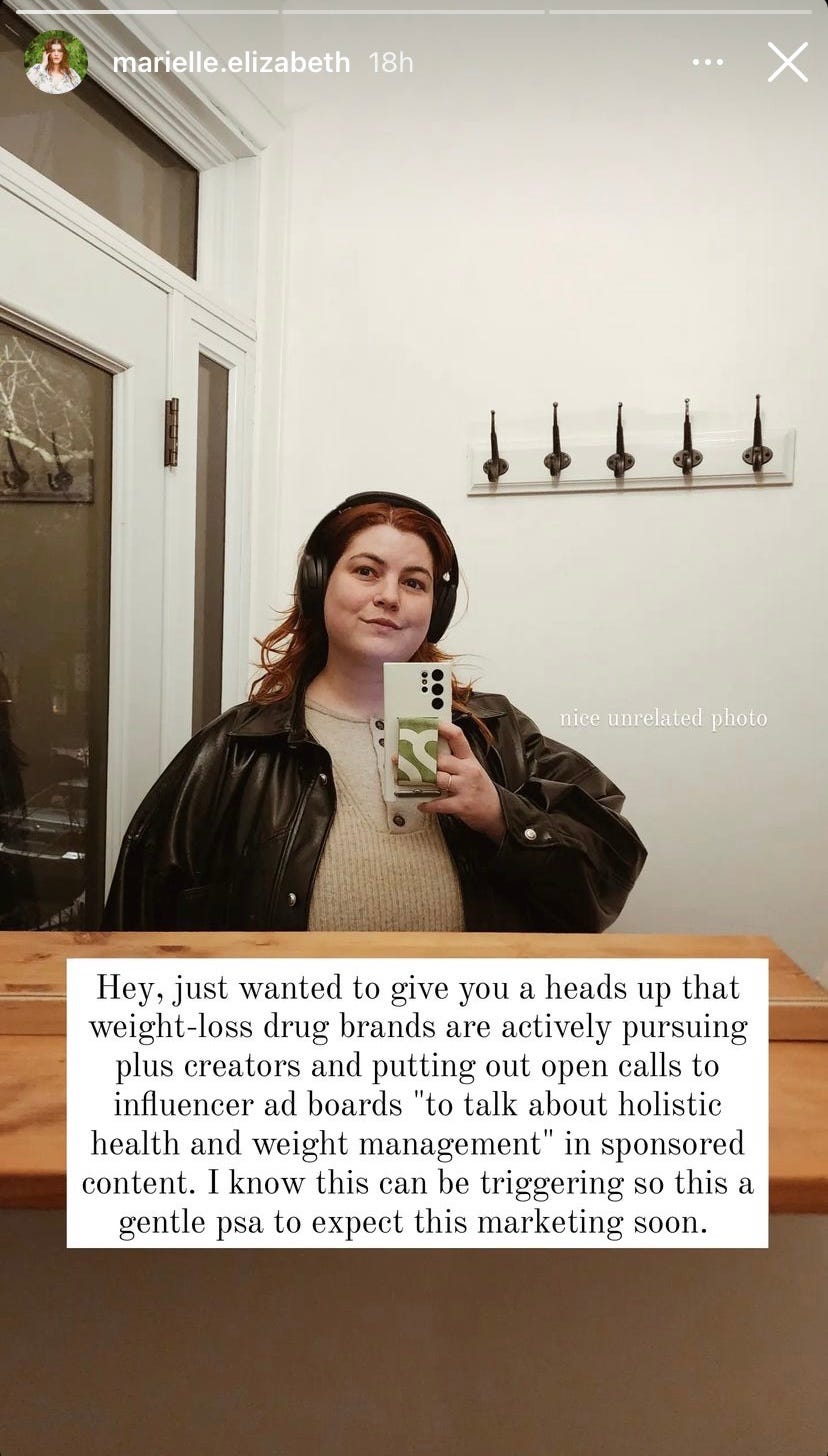
Virginia
I assume Marielle was like, “Get the fuck out of town.”
Corinne
I think she was posting it as like, “Heads up. This is coming.” Like, this is being pitched to creators.
Virginia
Of course it is. Of course it is. I mean, it's really hard because people's individual choices around their bodies are their own business. And, when fat creators take this turn, it often comes with a really clear intention to distance themselves from fatness. And that is really harmful. I mean, that is what we saw with Catherine's TikTok, responding to the creator whose name I forget [Note from Corinne: Gabriella Lascano, Google at your own risk]. She was saying things like, “I've had it all wrong,” and you know, “They've lied to you to think that it's okay to be this size.” It was very, like, conspiracy theorist and super unsettling to see that turn.
Corinne
I think the other thing that makes it so complicated is the money part. I don't know, my choice whether or not to pursue weight loss might change a lot if someone was paying me to do it.
Virginia
That's a great point. Yeah, that's super murky. I mean, that's like the actress from “This Is Us.”
Corinne
Oh, Chrissy Metz?
Virginia
It was in her contract that that character was going to lose weight. And of course, for that actor, that was a breakout role. Like, how do you not say yes to that part? Well, then you're signing on to this whole thing.
The other thing is, just because someone is public and fat does not mean they are a fat liberationist or a fat activist of any kind, right? That is something that I think we as consumers of content need to be more discerning about. Like, if you're following someone for their great plus size fashion, I hope it's Marielle Elizabeth who is also wildly articulate and brilliant about talking about fat liberation. But there's a lot of fat fashion influencers who have been very visible, but who are not necessarily focusing on fat liberation. That's a complicated space.
Corinne
For me, it just keeps coming back to the money thing. You're not seeing someone who's just making a neutral choice. You're seeing someone who is being paid to advertise something.
Virginia
100 percent.
It's also true that any fat person is experiencing the bias of going into doctor's offices and having their weight weaponized against them and having weight loss prescribed without any second thought. So, this is Layla talking about this experience of doctors offices and how that can really trigger the spiral of “I can't be this size” and needing to distance from fatness.
A few years ago, I went to the doctor for what I thought was a routine checkup. And as they do before every appointment, they asked me to step on the scale. And I was pretty shocked at the number that I saw, it was the most I had ever weighed in my life. I knew that my clothes had been fitting tighter, I knew that I had put on weight after having a baby, after moving three times in four years, after COVID. So I meet the doctor, and she asks, “ I understand you have some questions about your weight.” And I say, “I noticed my weight has been steadily increasing, I don't even know the right question to ask. Like, am I overweight? Or am I fat?” And she scanned her computer and she said, “Well, according to the BMI chart, your current weight puts you in the obesity category.”
So, I wasn't just fat, I was obese. And it felt like my brain was shrinking away from the sides of my skull. I just felt this hot prickle of shame on my skin and in my stomach. And what I heard in that moment was, “you eat too much.” The whole experience made me feel very shameful. But it also really forced me to reconcile the bias I’d had against fat people and also made me wonder how, as a woman, I'm supposed to navigate what my doctor is telling me with what society wants from me, what I want for myself, and what I want to be able to model for my young daughter when it comes to having a positive body image. And so I really appreciated this question about who gets to call themselves fat, and really hope to learn more about how to understand and be an ally for people who are in fact, in larger bodies
Virginia
This is a complicated one, right? And listening to this, I mostly just thinking, wow. If we had true weight inclusive health care where getting on the scale was not going to dictate your entire fucking medical appointment, Layla would probably have a completely different relationship with her body. And so would millions of other people.
Corinne
Yeah, I found this one honestly relatable because the experience of going to the doctor's office as a person in a larger body is like you're trying so hard to prove yourself, like, prove that you're ‘the good fatty’ or whatever. To me it sounds like she's almost trying to end-run the doctor being like, “you need to lose weight.”
Virginia
That makes sense. And I know from interviewing doctors about this, that there's a weird chicken and egg thing where often the patients bring up weight loss because they assume the doctor wants them to be losing weight. Then the doctor is like, well, they asked about weight loss so I have to prescribe weight loss. It's a weird self-fulfilling prophecy being driven by bias on both sides, which is a very complicated dynamic.
And I say this not to criticize the patient who brings that up. That's an understandable survival strategy in a very fraught encounter. But it definitely narrows the scope of the conversation. Who knows what else was going on with her health? She mentioned having had a baby, getting through COVID, moving a bunch, so tons of stress. Maybe weight gain is not the most important thing about what's going on with Layla’s health.
Corinne
Yeah, and shame just doesn't help.
Virginia
This also shows why it's important, to whatever extent feels possible, to neutralize the concept of fatness. Because if we didn't have that knee jerk shame response, it also wouldn't matter so much when doctors bring it up in the way they do. Which is not to say it's on you not to experience bias, because you're experiencing bias. But if we could more clearly hold that, the way you would if someone made a racist statement. This is that person's problem. Not a problem with my body. Holding onto that is hard to do with this.
Corinne
One of the reasons why we do reclaim the word fat is to also be able to acknowledge and center the experience of people who are experiencing more stigma. And now we're going to hear from Ann.
For me, reclaiming fat has been part of the work I'm doing to prepare to be a parent in a few years. My mom has her own struggles with her weight, even getting bariatric surgery at one point and it made me really uncomfortable with who I was. For some things being midfat is annoying, like planes, restaurants, seats. For some things, it's frustrating. I'm starting to be sized out of in store Torrid and Lane Bryant, for example. But the biggest thing that frustrates me is buying furniture or tools. I needed to buy an 8’ ladder for my house. Every single one I looked at was rated for 250 pounds or under. I couldn't even find a ladder that would accommodate my weight. Or if I do find something weight rated for me, like folding chairs, it's super ugly or not as useful as the straight size. Some people don't even have to think about a chair breaking on you.
Corinne
Hard relate. It's so hard to find shit like chairs.
Virginia
Yeah, I had a friend tell me recently that our dining chairs are not super comfortable for her to sit in and I was horrified. I'm really glad she told me. They have arms and I think they just cut in too much? So I do now have two armless ones that we can bring out when someone comes over. I really wanted to use this as an excuse to buy an entire new set of dining room chairs, but that felt somewhat excessive. Although, obviously, every seat at my table should be size inclusive.
Corinne
You do have a good excuse now. It's an accessibility issue in your private dining room.
Virginia
But I do now have some better chairs. This is maddening. This is maddening that it is, in so many realms of life.
Corinne
Also, just… a ladder? You know not everyone using ladder is 250 pounds or less. There's no way on earth!
Virginia
Absolutely not. That's really just so dangerous. Ladders freak me out just baseline. I'm really scared of ladders, so the idea that like they aren't making them sturdy enough is really upsetting.
Corinne
It seems like the cut off is so often like 250 pounds. I'm just so curious how that became the number.
Virginia
It's probably some industrial technicality like that's the scale they have to test the stuff.
Corinne
Like it only goes up to 250?
Virginia
Like it has nothing to do with any market research on who their customer is or what sizes people's bodies actually come in. They're like, this is the scale we have here in the factories. There's no thought in trying to be size inclusive or they would have found a way to both make a better ladder and rate it higher.
Corinne
Or maybe it's a liability thing. Like they're only responsible for if the ladder breaks for someone who weighs under that amount.
Virginia
So maybe that's an incentive to get it as low as possible, to be responsible for the least number of people falling off your ladder. Oh, god, that's so shitty. I think you're right.
This one also reminded me that as we're talking about language, it is useful to make the distinction between midfat and midsize. This has tripped me up in the past. We now all know from midsize queens, that midsize is like, a size four with a large ribcage. Or technically it was supposed to be between straight and plus sizes, but it's being very misused and being used to distance from fatness very concretely. Whereas midfat is between small fat and super fat, right?
Corinne
This is from The Fat Lip.
Midfat is defined as 2x/3x, Sizes 20-24, Torrid 2-3.
Virginia
Got it. Okay. And of course, that's super confusing because sizing is not standardized at retailers. There's so many brands where the 3x is like a 1x somewhere else. But just having the language is useful.
Corinne
Okay, next we're gonna hear from Krisanne who had an experience where she actually didn't use the word fat, but I think reclaiming the word is what enabled her to do this advocacy.
So by the definitions of the fat community, I would be considered midfat. I've been small fat or midfat for most of my life. But at 52 years old, it's only been in the last couple of years that I've felt comfortable using the term “fat” as a neutral term to describe my body. I had a lot of things to unpack with that term always being derogatory, but now it's just a fact. So I'm trying to be very cognizant when I use it that people know that I'm being neutral, that it's really obvious. I'm just stating a fact about my body size and I'm not passing a judgment about myself.
If I'm in a situation where I don't want to get into it, I don't want to open up a discussion about the term fat, I'll just say “larger body.” Like when I was trying out office chairs at the furniture showroom, I said to the sales guy that one thing I really appreciated about the chair I ended up buying was that it came in three different sizes, so I could get one that was actually designed to fit my larger body. I wanted him to know that I valued that aspect of the product and that that was part of why I was buying it. But I didn't need to get into the bigger discussion about the word fat. So large or larger would be those factual but not as loaded words that I will use if fat feels like it's too much in the context.
One word I'm not a fan of is curvy, because first of all, it's euphemistic, but it's also inaccurate for me. I'm not curvy. I don't have an hourglass shape. I don't have large breasts. And it's also a word that emphasizes some sort of feminine “ideal” and it seems to be coded as fat but still stereotypically feminine, as if that's a thing that I'm supposed to aspire to.
Corinne
I liked this comment a lot. I could relate. And I think I've done the same thing myself. It's just that thing where you know someone else might be uncomfortable with the word fat, so you use “larger body” or something like that to describe the same thing. I also liked what Krisanne had to say about the word curvy and feeling like it wasn't a word that applied.
Virginia
Yes. You think curvy, you think hourglass shape. And as someone who's not an hourglass shape, I'm always like, what do I do with that? But who does have boobs, for the record. I don't know. It's just a weird. A weird term because it comes with this whole like set of definitions about which curves are good.
Corinne
It feels like curvy is like you can still be like curvy and be sexy. There's something, like Krisanne says, feminine or something like that.
Virginia
There are so many terrible euphemisms. Fluffy is another one that drives me crazy.
Corinne
Oh, my God! Fluffy is the one I was gonna bring up. I hate that one.
Virginia
I admit, there was a point in my life where I thought it was cute. And I'm not okay with that.
I also think that euphemisms are just so unhelpful, like you said when you were reading that teen magazine and not knowing what plus size meant. This is the other reason to reclaim fat and to use fat if you feel any identity with it, because: Let's just be clear about what we're fucking saying. And not dress it up.
All right. So we're going to end with Lauren who shares a recent experience where being able to say “I'm fat” helped to concretely improve a medical experience.
This one is just lovely. Lauren, yay you. I love that you did this advocacy. And I love that the physical therapist was so responsive.
I'm looking for a physical therapist for a shoulder injury in addition to some other things. Filtering for my neighborhood, there were two insurance possibilities. One openly said that they'll help you with weight loss, which is a huge red flag. So I took a chance, on the strength of a very upfront Black Lives Matter policy, and filled out the intake form for the other physical therapist. This physical therapist called me a few days later to confirm my appointment and see if I wanted to be put on a waitlist to get in sooner. We talked about my complaints a bit: primary shoulder with secondary leg tendonitis. But she hadn't gone over my forms yet. We hung up.
No more than 30 seconds later, she called me back having looked over my information on the intake form. There's a spot for anything you'd want them to know, so I wrote something to the effect of “I am fat, I believe in a weight neutral framework and will not accept weight loss as a treatment suggestion as my complaints are unrelated to my body size. I just request that if you're not comfortable working with a Health at Every Size philosophy that you let me know so I can continue researching PTs. But if you do, I'm looking forward to working with you.”
So back to this physical therapist. Calling me back, she sounded so excited. “I just love how you advocated for yourself and you have absolutely contacted the right place. The local newspaper just did a three parts on a piece about how our medical system is overly focused on weight loss and the O-word epidemic and I cut out the article from the Sunday paper and hung it up because it's important to remind myself and also let other people know where my values are.” I'm all about building strength and balance in the body you have and helping you do the things that you want to do. For me, it was such a shot in the dark and such an incredible affirmation from a thin medical professional. I started with him this month and maybe it will be different experience once we get going though I kind of doubt it. Listening to you, Virginia, and Aubrey Gordon and Mikey and so many others, as well as finding community in the comment sections, the Facebook groups and cultivating my care team to be weight neutral has been such a life changing experience. Embracing the reality and cutting through the bullshit has led to some really positive relationships in my life. Thank you.
Corinne
I loved the physical therapists response. It made me really happy
Virginia
That she had the newspaper article cut out? Amazing. More of this. And I think this just really underscores why, even if you're in a context where you're not exactly using the word fat, like in the previous story, I think the act of reclaiming it is what enables you to then do that kind of advocacy.
Corinne
Yes
Virginia
Thank you so much for everyone who sent in your voice memos. We really love hearing from you. It's so fun to have all your voices on the show. And I hope this discussion was helpful or if you are someone who's thinking about how to use this word, maybe this moved you a little bit forward towards feeling good about saying fat.
Butter
Virginia
We are going to wrap up like we always do with butter. Corinne, what do you have for us?
Corinne
My butter is a an essay that I just saw from the writer
. She just published kind of a musing on the movie "The Whale," which we just talked about. The piece is called When Whales Fly. And I recommend it. It was just a really good read.Virginia
And again, I'm so grateful to everyone who was willing to interact with that movie in order to produce much better art. That's really the best possible outcome of that travesty. So thank you, Carmen, always for your beautiful work.
My Butter is the leggings I keep talking about. If you're following me on Instagram, or read Tuesday’s newsletter, I'm sorry. You've already heard about this. But I just tried Girlfriend Collective for the first time. And, like, can you even call yourself into fat fashion if you haven't done Girlfriend Collective? I feel like I just got a punch on my card or something. It was important that I do this. I have the high waist compression leggings. And they are the only leggings I have had in a very long time that do not fall down.
Now, I will tell you, when I said that on Instagram, I immediately heard from a bunch of people who said they fall down. Because that's how clothes work. Like, I can't guarantee this. I did hear from a lot of hourglass shaped people saying this. So maybe the fit model may be more of an apple, for lack of a better word, shape. So if that is your struggle—and it's not a struggle, our bodies are great. But if clothes that fit that shape is your struggle, then this might be a good brand for you. They're super comfortable, they do not fall down. They really hold their shape, no saggy knees, etc. The fabric is very thick. At first I was like, will these move with me? Like, it's dense. But I actually really like it and it's probably more athletic feeling. I don't think these are a dressy legging.
Corinne
Like a little shiny?
Virginia
It's a little shiny, but I don't mind it. I'm enjoying it. And I did get the Paloma bra to go with it. That's just one of their sports bras that I'm also really liking and this is my first time doing like a “set.”
Corinne
Did you get a cute color?
Virginia
I got navy blue, but I might have wild iris on order. It hasn't come yet, so stay tuned because it's a really pretty periwinkle/purple. (Spoiler: It has arrived.)
Corinne
That sounds amazing.
Virginia
I'm not wearing them to be athletic in, I was wearing them to do my taxes last weekend and I was like, “Everything about this day is a dumpster fire but I do love my outfit.” So that was good.
Corinne
Yeah, I recently started wearing a lot more leggings because of going to the gym. Like I started wearing to them to the gym and then I was like, “Wow these are so comfortable.”
Virginia
and you're like why am I wearing real pants?
Corinne
I need to be wearing leggings all the time.
Virginia
Yeah, well you were doing actual athletic things in them with your weightlifting.
Corinne
I mean it went from that to everyday life.
Virginia
I have different leggings I wear if I'm going to do one of my Lauren videos or go walk the dog in the woods. And these are my nice leggings.
Corinne
Oh wow. Okay.
Virginia
These are my cute leggings.
Corinne
Wow, fancy leggings. I mean, they do wear out.
Virginia
For a long time I was on the Universal Standard bandwagon of leggings and those leggings don't fall down either. They're very high waisted ones.
Corinne
Okay WHICH ones though? Because they have like 10 different leggings.
Virginia
Maybe I have next to naked?
Corinne
Is it like a matte?
Virginia
It's matte and it’s much thinner. It's much thinner than the Girlfriend Collective. And my criticism of them is that they pill in the thighs.
Corinne
Oh, yes. Are they black?
Virginia
I have black and navy and I have like a seafoam color.
Corinne
Yes, that's the next to naked.
Virginia
Okay. Super comfortable.
Corinne
Those ones do pill.
Virginia
And there's not really any compression. And I didn't know that I liked compression. I want to be clear, I'm not saying compression like makes me look thinner. I still look fat. I just like it. It feels more…
Corinne
A sensory thing?
Virginia
It's a nice sensory experience.
Corinne
Yes, like being wrapped in a little cocoon.
Virginia
Totally. I like it and I know Mia O'Malley was talking about this and how it helped her feel more supported, like her belly and her back. I mean, it's mild. It's not like you're wearing a back brace. It's just like, I feel like my posture is a little better in them. Anyway have you tried Girlfriend Collective?
Corinne
I feel like I tried them a long time ago and I remember thinking they fell down.
Virginia
Don't trust me on anything, guys.
Corinne
The leggings I like now are Superfit Hero.
Virginia
They are next on my list.
Corinne
I actually think they are similar. But they have a pocket which I really like.
Virginia
That's an upgrade.
Corinne
And it's the athletic-y material. They don't have a waistband and then I like these ones from Universal Standard that are more cottony and have a waistband. I do wear them to the gym but I also would wear them to run errands or whatever. But it's not an athletic material, It feels more just like a stretchy pants.
Virginia
This is good intel.
Alright people, this was a great conversation about fatness and also an unexpected deep dive into leggings science.
Thank you so much for listening to Burnt Toast!
Corinne
If you'd like to support the show, please subscribe for free in your podcast player and leave us a rating or review. These really help folks find the show.
The Burnt Toast Podcast is produced and hosted by me, Virginia Sole-Smith. You can follow me on Instagram, Twitter or TikTok.
Burnt Toast transcripts and essays are edited and formatted by Corinne Fay, who runs @SellTradePlus, an Instagram account where you can buy and sell plus size clothing.
The Burnt Toast logo is by Deanna Lowe.
Our theme music is by Jeff Bailey and Chris Maxwell.
Tommy Harron is our audio engineer.
Thanks for listening and supporting independent anti-diet journalism!

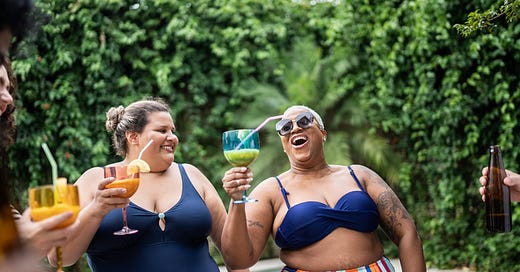
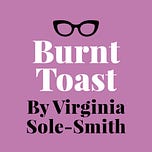


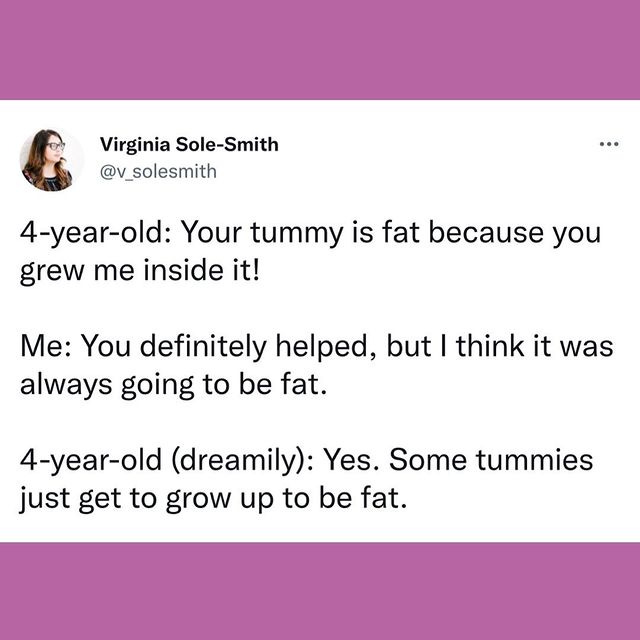






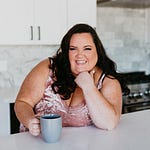
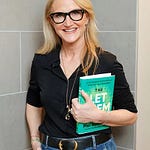
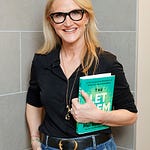




Share this post